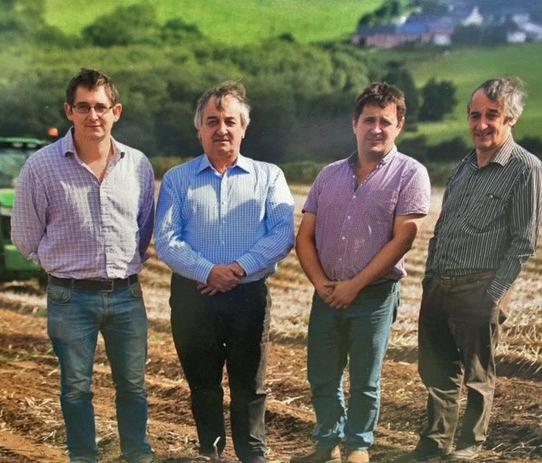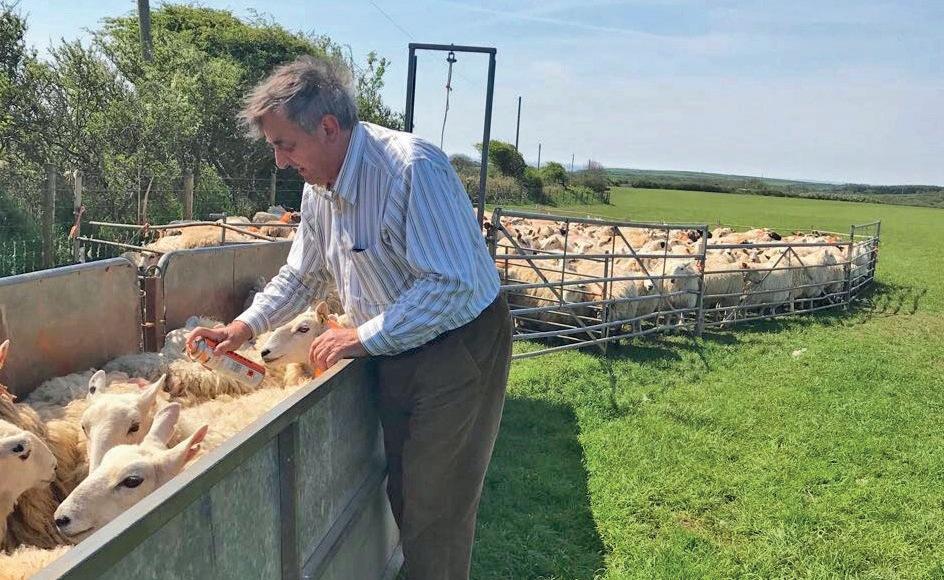
4 minute read
Pembrokeshire Chairman
The Club’s 2023 Chairman farms in Pembrokeshire and is well known throughout UK farming. Charles Abel delves a little deeper
FORMER NFU President Meurig Raymond, Club Chairman for 2023, brings a gritty appreciation of the practicalities UK farmers face, the way policymakers, buyers and consumers think, and a deep appreciation of the role The Farmers Club plays.
But first things first. The name is pronounced “my-rig”, reflecting his birth and upbringing in West Wales, where he now farms 3500 acres in a heavily capitalised family farming partnership.
As NFU President from 2014 to 2018 he earned a deserved reputation as a capable leader, equally connected to grass-roots farming and respected in Westminster, Brussels and beyond.
His hallmark has long been a ready desire to listen to arguments, with a wily appreciation of the issues and passions underlying them, and a strong drive to broker solutions, be it with Ministers, Defra Secretaries, policymakers or produce buyers.
NFU service
Meurig joined the Club in 1990 and it was soon homefrom-home as he held increasingly senior roles, serving eight years as NFU Deputy President and two as Vice President, having started out as Pembrokeshire’s youngest NFU county chairman in 1989. “I learned so much at the Club, from listening to others, and really understanding their views.”
So, does he miss the NFU days? “Yes, sometimes, but the role is much more challenging today. I enjoyed it most of the time, some days were frustrating and there were occasions when you could get really angry. But I would not have missed it for anything.”
He remains very much an active farmer, engaged with the diverse West Wales farm business created with twin brother Mansel. Back in 1967, aged just 14, they inherited the 290 acre home farm when their father died. With support from their mother, and older brothers Leslie and Gilbert, who were already farming in their own right, a farming dynasty was born.
Day release studies at Haverfordwest College led to a planned programme of land purchases. In 1985 he attended the Worshipful Company of Farmers Advanced Farm Management course at Wye College, making long-lasting friends who have been a great support over many years.
By now the business was farming 1000 acres. Milk quotas and high interest rates created a huge strain, but they persisted, Meurig’s persuasive skills no doubt convincing the bank to lend more money for even more land purchases.
Family business
The family partnership, led by the brothers, wives Hilary and Rosalind, and Meurig’s son Paul and nephew Nigel, now farms 3500 acres across Pembrokeshire, including 1400 owned acres and a wide range of rental agreements.

Significant restructuring has provided sensible field sizes, two modern dairy units, grain drying and storage facilities, and more recently reservoirs, underground irrigation mains and potato grading facilities. Staff include 18 long-serving full-timers and 8-10 seasonal workers, this year from Kazakhstan.
Combinable crops typically account for 2000 acres, with over 400 acres of potatoes on owned and let land. Jordanston dairy has 380 milkers, Trenewydd 280, and the farm also runs 3-400 dairy replacements, up to 300 beef cattle and around 2500 store lambs are fattened over the winter.
Family, friends and staff have all been tremendously supportive through Meurig’s career, and he regularly pays testament to this, including daughter Nicola who lives and works in Australia, and youngest son Jonathan, a City investment manager.
The farm’s open business structure means Meurig can remain involved, but also find time for other senior industry roles, including Food From Britain, HGCA, RABI, the Prices Countryside Fund, Oxford Farming Conference and NAAC. He was awarded an MBE in 2014 and CBE in 2018 for outstanding services to the farming sector, and has received an honorary fellowship at the Royal Agricultural University and honorary doctorate from Harper Adams University.

He admits to being “fairly optimistic” about the industry’s future. “I still believe our consumers and society as a whole will demand that we produce more food.”
Clarity in policy
But while the industry has been restructuring for many years, and will continue to do so, he has noticed a tiredness, and uncertainty. “I meet a lot of farmers who are concerned about the lack of clarity in policy, and they are tired, especially where labour is difficult to source, for intensive livestock and cropping.
“They ask why they are risking large amounts of capital for the risks involved and lower than expected returns. The industry can increase production, but it needs to be given confidence.”
On devolution he has clear views. “To have a productive, competitive agriculture food has to travel across political borders. Our potatoes are processed in Wales, by Puffin Produce, which adds value and sells 60,000t to Welsh supermarkets, which is great for the Welsh economy.
“But there is not the processing capacity in Wales to add value to all the produce that Welsh farmers produce. Our milk goes to Muller at Severnside, oilseed rape to England for crushing, and our 1000t-plus of spring malting barley goes to Norfolk to be processed, even though it returns to Wales for distillation and brewing into Welsh drinks.”
“So, whilst there might be policy tweaks, the rules need to be basically the same. Commerce needs to work across borders, especially for red meat.”
His biotech views are equally clear. “It can help farmers reduce demand for inputs, like nitrogen and crop protection products, to combat climate change and support the environment. But the devolved nations need to support the UK position.”
Turning to bovine tuberculosis the gritty realism so often unrecognised by politicians and policymakers is evident. “We’ve been TB testing for five years. It’s had a huge impact. We have lost 200 animals over the past five years. It is an absolute nightmare; we are testing animals every two months and it is inevitable that staff and animals are injured on occasions.”
He believes the policy in England has helped control the disease where it was once rampant. “Policymakers need to follow through on the science. Otherwise, the mental and physical difficulty means some farmers will simply exit the industry as soon as they are TB free,” he notes.
But despite the industry’s pressures, the Club’s prospects remain strong, he believes. “There are 140,000 farmers in the UK, so there is a big pool to draw from. I would encourage anyone involved to become a member. It’s been hugely valuable to me and I look forward to taking it forward in 2023.”
The Rt Hon Lord Benyon, Minister of State at Defra, spoke at the Club’s Monday Evening Lecture late last year. Charles Abel reports







